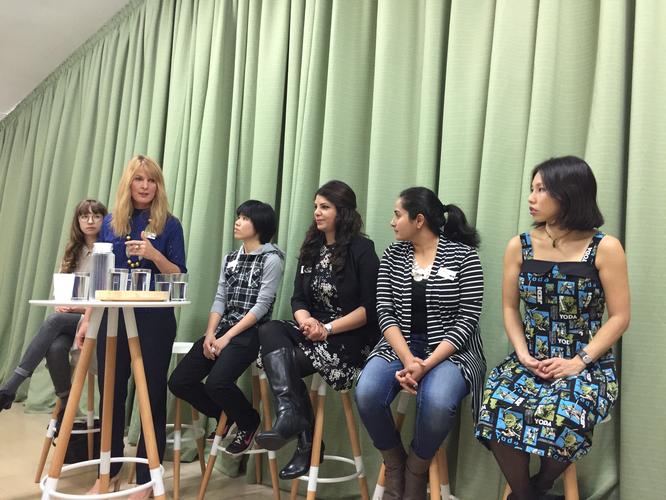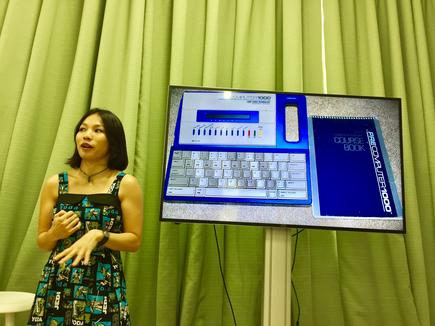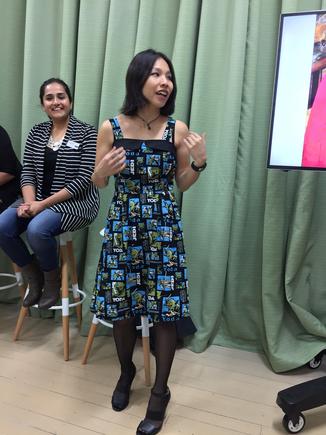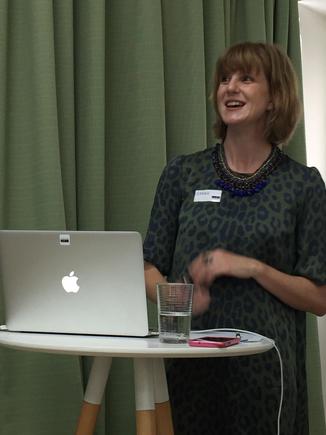
In the panel (from left): Alex Garkavenko, data architect, Dexibit; Frances Valintine, founder, Tech Futures Lab; Nitkalya Wiriyanuparb (Ing), software engineer, Orion Health; Mahsa Mohaghegh, She# founder/ lecturer - School of Engineering, Computer & Mathematical Sciences, Auckland University of Technology; Priti Ambani, co-founder/COO, The Next Billion; and Vivian Chandra, tech strategist and independent IT consultant.
Frances Valintine, founder of Tech Futures Lab and chair of The Mind Lab at Unitec, says a number of women who ended up in technology did not start in technology.
“They went zigzagging, moving and pivoting, it is not a natural pathway,” says Valintine.
“You can not be what you can not see,” she says. "When the board is 90 per cent male, who wants to be the 'token imposter'”?
This is the reason why it is important for organisations to bring women to all parts of the business, says Valintine, speaking at the panel ‘Breaking stereotypes - an insider view of women in tech’.
The forum, which was held as part of NZTech Week, brought together a panel of female ICT professionals, all at different points in their career, to talk about how they are making a dent in the male-dominated industry.

We should encourage other women to bash through the glass ceiling
Joining Valintine in the panel were:
- Alex Garkavenko, data architect, Dexibit
- Nitkalya Wiriyanuparb (Ing), software engineer, Orion Health
- Mahsa Mohaghegh, She# founder/ lecturer, School of Engineering, Computer and Mathematical Sciences, Auckland University of Technology
- Priti Ambani, co-founder/COO, The Next Billion; and
- Vivian Chandra, tech strategist and independent IT consultant.
Most of the participants in the panel followed a non-linear path to their chosen careers. But all of them are now making a dent in the traditionally male dominated ICT sector.
‘Keep learning’
The hardest thing to do is finding women to put themselves forward as role models, says Valintine, as she lauds the work the panel members were doing to promote both ICT as a career and diversity in the sector.
It is critical for women and other under-represented people in the sector to get over the 'imposter syndrome', she says.
The term refers to high-achieving people who experience self-doubt about their skills and fear being exposed as a fraud.
“We are not imposters. We have every right to be there,” she says.
“We should encourage other women to bash through the glass ceiling,” says Valintine, who is also the 2017 Flying Kiwi awardee.
Valintine says her childhood upbringing had a big influence on her views around work.
“My father was a feminist,” says Valintine. “I was never told I could not do something. You could do anything you wanted.”
She proved this when she was growing up in a farm and learned how to do all the work, including chopping wood.
She cites the importance of knowing what are the roles going forward and making sure children are encouraged towards these roles.
A challenge is how to get children excited in technology and how to make technology accessible to them, she says.

She tells the audience each one of them can make a difference even in one young woman’s life.
Valintine is involved in First Foundation, which provides scholarship and mentoring to students from low decile schools.
She is currently working with a student who will be the first child in her family to go to university, and who wants to work in technology.
"If you have an ability to influence girls in high school, do so," she says. "You can give them work experience, or ring your friends who may be able to provide them that exposure to the industry.
“If not, they are going to be left behind.”
Valintine says the male executives also play a part in the goal for diversity in the sector. She claims there are now male executives who do not want to speak in a conference, if there is only one woman speaker and the 15 others are male.
She also advises to “find your tribe”, “a group of people who “have got your back no matter what”.

They may be people in your social life, in your neighbourhood or at work.
She has a group of other women professionals who she met in functions. “We had similar ambitions for what we want, with a New Zealand vision for our children.”
Valintine says a number of large businesses are facing challenges, resulting in massive redundancies.
“Only sectors built on a technology platform or a startup are scaling,” she observes.
Continuing education is critical for success in the ever changing ICT sector. She says there are now thousands of free courses online, from data science to machine learning.
“We have to keep learning, our brain loves to learn,” says Valintine. “We learn from the past. But clearly we should have floodlights into the future.”
“You are the person who carries you forward. You have to look into the future. If we don’t ... the next generation will be further held back.”
“Stay curious,” she says. "Ask, what can I learn today?”
‘Have an open mind’
For Alex Garkavenko, an interest in architecture led her to her current job as data architect at Dexibit.
"I am now exploring the space between data, storytelling and design," says Garkavenko.
Garkavenko came from the Ukraine and her initial course, architecture, opened her to the world of programming. She then completed a graduate certificate in computer science.
She says at architecture school, boys were the minority, so moving to an industry where this is not the case was a huge shift for her.

I have moved from being a physical architect to one that does similar things with data
“I have moved from being a physical architect to one that does similar things with data,” she says of her work at Dexibit.
The company provides analytics on visitor behaviour onsite and online, enabling data driven decisions that increase visitation for museums and other cultural institutions.
The following quote from Miranda July inspires her: “Don’t wait to be sure. Move, move, move.”
“We all experience the imposter syndrome,” she says. “Sometimes, our biggest hurdle is ourselves.
“Keep challenging yourself, pushing yourself out in front of people,” she says. “We should channel [the imposter syndrome] in a positive way.

For Nitkalya Wiriyanuparb, software engineer, Orion Health, what is important is to have an open mind.
“A mind is like a parachute. It doesn’t work if it is not open,” she says, quoting Frank Zappa.
This perspective guided her as she forged a career in ICT, following her completion of a bachelor of computer and information science at AUT.

'Make a difference'
Another panellist, Vivian Chandra, says it is also important to look at diversity of thought.
She echoes the sentiments of other women in the panel, who say they need to involve the men to help break gender stereotypes.
She cites the case of her husband, who gets comments from people when they see him taking care of their two children. When people say he is babysitting, he corrects them with this: “I am not babysitting, I am parenting.”
Chandra has a degree in physics and has completed her master’s degree in sociology, where her dissertation was on ‘everyday sexism within an Aotearoa context’.

Chandra recalls that when she was nine, her father, an accountant, bought her a computer.
That led to her interest in computers, which she was able to combine with her social activism.
She worked for nearly 10 years as ICT manager at Amnesty International in New Zealand, and is now an independent technology strategy consultant.
She quotes Alice Walker: “Activism is my rent for living on the planet.”
You can make a difference, even with one person, she says.
Her first job was as a computer technology staff member in a high school. During her tenure she organised a code club and years later she met one of its members, who remembered how she introduced her to IT through that club.
Today, she is a volunteer for OMGTech! that holds workshops for children aged eight to 12, to introduce them to future technologies.
She says the events provide opportunities for the children, but also show the contrasting situations of the attendees, as they come from both low decile and high decile schools.
Her son, aged 9, who joins her in the workshops, once helped a 14-year-old student who had never touched a computer.

One of her best experiences was talking to a child after one such workshop.
The child said his father is a bus driver and thought that was what he was going to do in the future. But at one of the workshops, he learned in the future, people may be riding driverless buses. He now wants to be a robotics engineer.
Priti Ambani is an engineer who co-founded The Next Billion, which provides female-led enterprises worldwide with ‘access to growth opportunities’.
She is bringing to New Zealand Access2, a series of dinners hosted by business leaders. The latter will invite six to eight female entrepreneurs into their homes and share them insights on how to grow their business.
"We are all part of the technology ecosystem," she states. “We have to be active members of the industry that is technology-enabled.”
"We need to put ourselves out there," she says, on the drive for her advocacy for women entrepreneurs.
Ambani says one billion women are set to enter the economy as employers, entrepreneurs and producers. But they are also under-represented, with only about one-third of global entrepreneurs being women.
As an example, she says, when technology CEOs are mentioned, people think of Steve Jobs, Bill Gates and Elon Musk. But not many people know the name of the CEO of IBM, Ginni Rometty.

"The women are there, they are not just as visible," she says. “We need to put a spotlight on inspirational and accessible role models.”
Mahsa Mohaghegh is a computer engineer with a focus on AI and natural language processing.
She has a PhD in statistical machine translation and is the founder and director of the group She#.
It is almost unanimously agreed that a more gender-balanced tech sector would provide significant benefits across the board – to both males and females alike, says Mohaghegh.

It is almost unanimously agreed that a more gender-balanced tech sector would provide significant benefits across the board – to both males and females alike
She# (pronounced ‘She Sharp’) was founded in June 2014, and is primarily a group for high school girls, female tertiary students and industry professionals.
She believes one way of addressing the gender gap issue is to create an atmosphere where female high school students can see how exciting and relevant technology is to their lives.
She# programmes provide them with the opportunity of seeing inside tech companies, meeting their employees and networking with female role models within the industry.
As a computer software engineering student in Iran, Mohaghegh says was the only girl in a class of 50.
Mohaghegh says the situation was not that different years later when she started lecturing at Unitec. Women comprised less than 10 per cent of the classes, she says.
Maybe it has something to do with perception about the industry, she says.
Thus, it is important to expose students to IT early on, she says. “Hopefully, we will see more women considering career paths in the future in IT.”
She explains a typical She# event is hosted by a tech-related company. It consists of keynote speakers who share their passion for science and technology, what brought them into the field and the experiences, challenges and successes they have faced.

The events are not exclusive to women, she says.
“If we really have a problem with gender diversity, we have to have males as part of the conversation.”
She encourages male ICT colleagues to attend She# events, so long as they bring some of their male friends.
They also invite male ICT leaders to speak. One of their recent speakers was Westpac CIO, Dawie Olivier.
She makes sure the second part of each She#event will include something the students can work on, which they can show to other people, at school and at home.
They have had workshops where staff from Xero talked about project management and Agile. Then they played a game based on the Agile methodology. In another session, the students were encouraged to build an app for mobile phones.
Mohaghegh was earlier involved in a group that organised events to help university students meet with ICT professionals.
“But I really wanted to change the ratio by introducing computer science earlier. If you want to change it, we have to go to high school students, bring them to these events and try to show them what is happening in the field.”
Mohaghegh was in her second year of her PhD, when she became a finalist for the Anita Borg scholarship at Google in Sydney.
Google started the scholarship in honour of Borg, an American computer scientist who had a vision by year 2020 to have 50 per cent female and 50 per cent male in the workplace, explains Mohaghegh.
Borg, who died in 2003, started the Institute for Women and Technology (now the Anita Borg Institute for Women and Technology) and the Grace Hopper Celebration of Women in Computing.
Borg worked really hard to get women motivated in this field, Mohaghegh says.
When Mohaghegh returned to New Zealand, she talked to other women who also wanted to promote gender diversity in ICT.
“I know one person can’t do much, so I looked for a group of passionate women in this field. Together, we can have an impact.”

Send news tips and comments to divina_paredes@idg.co.nz
Follow Divina Paredes on Twitter: @divinap
Follow CIO New Zealand on Twitter:@cio_nz
Join the CIO New Zealand group on LinkedIn. The group is open to CIOs, IT Directors, COOs, CTOs and senior IT managers.
